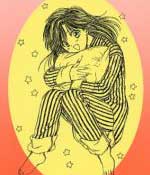
by Luis Reyes
"I personally put a lot of fight scenes into my stories," Yu notes. But blurred lines between styles also leads to men - still the majority presence in the manga and anime fields - muscling in the territory of already grossly under-represented female manga artists. Of course it also means that more barriers to female artists in general are being broken down. So now women are finally in a position to engage in competition not with male colleagues but with manga artists collectively.
"Competition is very high," Yu admits. "There are constantly new artists debuting and there's a lot to compete against. The goal is to stay alive and stand out in this sea of endless debuts. My trick is to not do the same stuff over and over again. Constantly challenge new topics, new directions, new worlds to keep things fresh." Trying to come to some kind of close, I inquired of her experience at art school. For a short time she attended a professional art academy in Tokyo but left. I was curious as to what she felt she needed in her artistic development that art school just could not provide.
"I pretty much wanted to quit art school after I learned how to draw characters," she answers. "I heard that they went on to discuss how to draw the stories, so in hindsight maybe I would have liked to stay and learn how to do that, too." Obviously, Watase Yu was able to surmount the hurdle of storytelling on her own, her manga currently more popular than ever, and with the anime for Fushigi Yuugi and Ayashi no Ceres released domestically (by Pioneer and Viz respectively) she is developing a new audience in North America. She is by far the most popular female manga artist to come through the circuit since Rumiko Takahashi.
"I think I probably learned a lot from [Takahashi's] work," Yu reflects. "In my teens I read a lot of her. I was reading Urusei Yatsura when I was in elementary school. I think I definitely learned something from her works." With that, the horde of Viz liaisons, producers and yes-boys indicate the end of my interview with bustling activity and usher me out to allow Watase Yu time to ready herself for yet another panel. As I leave, one of the Viz staffers tugged on my shoulder, congratulating me on one of the more thoughtful and insightful interview he has been forced to sit through over the weekend. At that point it dawned on me that I never asked one of the questions that I had prepared. For all of her shy mannerisms, Watase Yu is an excellent conversationalist with the uncanny ability to insinuate herself into even the most perfunctory of inquiries. She certainly steered that interview, just as she steers the dynamic path of her characters and her career.
|
||||||
|
Ayashi no Ceres © Watase Yu / Shogakukan / Bandai Visual / Studio Pierrot.
Fushigi Yugi © Watase Yu / Shogakukan / Bandai Visual / Studio Pierrot / MOVIC.
Pajama de Ojama © Watase Yu / Shogakukan.
|


